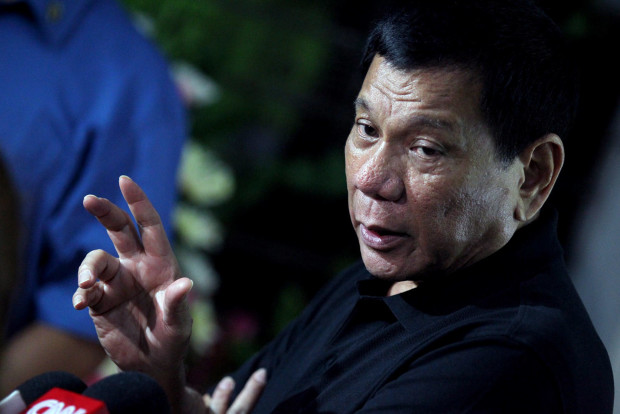Duterte stands pat on troop deployment to rural areas
DAVAO CITY – President Duterte has said he does not want the ceasefire with communist rebels to collapse but he is standing by the continuing deployment of government soldiers to the rural areas.
The President told the reporters that both the military and rebels have not been prevented by the respective unilateral ceasefires of the Philippine government on one hand, and the Communist Party of the Philippines, the New People’s Army and their negotiating arm, the National Democratic Front of the Philippines, from moving about in the provinces.
In an interview with reporters during his visit to his parents’ tomb here upon his return from his South American trip last week, Mr. Duterte said movements of government troops in rural areas should be seen as normal part of the security forces’ responsibility in maintaining peace and order.
“I have been very clear and categorical to them. This is the Republic of the Philippines. So the soldiers and police should be anywhere and everywhere,” he said.
But a regional spokesperson for the New People’s Army forces in Northeastern Mindanao, which covers Caraga region and parts of Northern Mindanao, particularly Bukidnon, has warned that the deployment of soldiers in these areas has been a clear counterinsurgency move, which undermines the goodwill of the unilateral ceasefires.
Article continues after this advertisementKa Allan Juanito, the rebel spokesperson, said soldiers and police have been sent to 78 barangays (village) in at least 22 towns in Agusan del Sur and Agusan del Norte province and in the regional capital of Butuan City in Caraga, as well as in Bukidnon and Misamis Oriental provinces in Northern Mindanao.
Article continues after this advertisementJuanito said the deployments have defeated the purpose of the cessation of hostilities, which the Philippine government and the communists had separately declared as part of confidence-building measures between the two sides in the resumption of talks.
The NPA spokesperson has accused the military of conducting surveillance in communities in the guise of medical and dental missions, and supporting the police’s crackdown on illegal drugs.
Duterte said he has directed the military and police not to initiate contacts with communist forces to prevent armed encounters.
“We are on a ceasefire so do not fire a shot, do not initiate an encounter there because there’s a peace process. But (it) does not deprive us of territorial jurisdiction,” the President said. “The Republic of the Philippine should be the one to decide saan ko ilalagay ang mga tropa ko (where I should place my troops),” he added.
The 71-year old Commander in Chief of the 125,000-strong Armed Forces of the Philippines said the rebels have not been prohibited from moving around, and would not be arrested if they were to conduct meetings and gatherings in urban centers.
“I would also like to tell them (rebels) that it’s OK for you to move around. Sabihin ko sa gobyerno hayaan mo silang mag-campaign, mag-enlist, mag-meeting. Ang bawal dito ang barilan (I will order the security forces, let them conduct campaign, enlistment and meeting activities. What’s not allowed here is the shooting),” Duterte said, even inviting insurgents to have their plenum (gathering) at downtown Davao.
A regional military official in Mindanao has defended the movement of troops in communities as a move based on the request by local civilian officials.
The military usually signs a memorandum of agreement (MOA) or memorandum of understanding (MOU) with local officials whenever soldiers are sent to communities to extend assistance, according to Capt. Joe Patrick Martinez, public affairs officer of the Philippine Army’s 4th Infantry Division based in Cagayan de Oro City, which has operational jurisdiction over troops deployed in Northern Mindanao and a large part of Caraga.
The MOAs or MOUs specifically spelled out the nature and extent of assistance the military would give to a certain community or project, Martinez said.
Since the ceasefire declaration from both sides last August, the military in Mindanao said it has not monitored any violent incident between the Army and the NPA.
The President also guaranteed no rebel would get arrested “so we can have a conducive environment to talk about peace.”
Mr. Duterte said he has even opened Malacañang to the communists to show his sincerity in finding ways to end the communist rebellion that has killed over 40,000 people in almost half a century.
“At the end of the day, it’s always a person’s principle. It was me who was interested that we talk. I don’t want the ceasefire to be cancelled or terminated. But certainly I cannot order the military to withdraw from anywhere,” he said. SFM/rga
